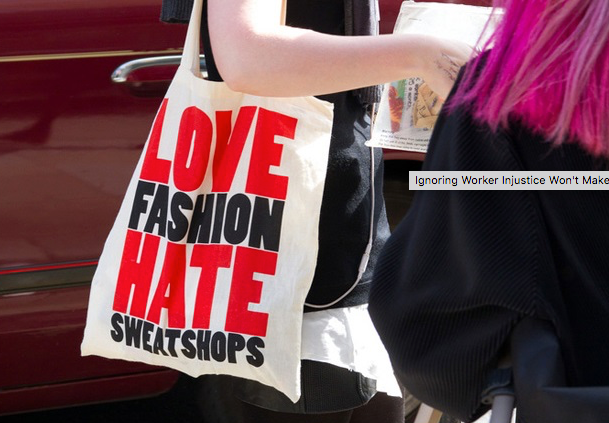

Christianity Today recently posted an article in response to the tragic garment factory collapse in Bangladesh. We liked it so much we thought we'd repost it here.
Please share your thoughts below!
APR 30, 2013
Taking the source of our shopping seriously.
Wendy McMahan, guest writer
. My seamstress died last week. She was crushed when an eight-story building fell on her. It's tragic. I'm outraged. Somehow, the clothes on my back—the clothes I bought and will buy—are intertwined in what could be Bangladesh's worst industrial disaster to date, killing more than 800 (the AP had reported the death toll could soar to as many as 1,400). In fact, when the garment factory she worked in collapsed, she may have been making a blouse for me or my daughter. I don't know her name, and I didn't hire her directly, but that doesn't make her any less human. And it doesn't make me any less involved in this web of supply and demand. They were making clothing for companies that you and I know—companies where I have bought clothing for myself and for my children. Without placing undue blame on the consumerism of Americans and the rest of the Global North, and without making this all about us, we still need to stop and consider how most of us have supported an industry that lets people work in these dangerous conditions. Ultimately, our spending reveals we tend to care more about the price of our clothing than the conditions under which they are made. Even after the tragedy, the news that such a factory would be making our clothes didn't come as a complete surprise. We knew it already. Most of us have heard of sweatshops, where labor laws are violated, wages are unfair, or conditions are hazardous. For decades, clothing manufacturers that supply the U.S. fashion industry have been accused of relying on unethical working conditions for the cheap products we buy. We feel aghast when we hear such reports… at least initially. We might even share a news article with friends. And then, with our most powerful voice—our wallets—the majority of us simply pretend as if we had never heard the news. What keeps us from caring enough to ask how our clothing is made? In part, it's too far away. I will never meet my seamstress. When we try on a pair of jeans folded on a shelf at the mall, we can't see the woman who stitched the zipper. The "Made in Vietnam" tag doesn't tell us whether our clothing came from a machine or from a living, breathing person with a family at home. Because we can't see the workers, it becomes easier for us not to feel guilty for the criteria we use as we buy. Shopping to find a good deal or a cheap price isn't inherently evil, and it can be a positive thing. The "wife of noble character" described in Proverbs 31 was thrifty. "She sees that her trading is profitable" (Prov. 31:8). Saving money can mean a better life for our families and more funds left for us to generously give to others. But if we could meet the person who made the pair of jeans we try on in the dressing room, we would likely reevaluate our decision to consider price alone. Shoppers may also keep in mind the identity and contentment issues we attach to fashion. We live in a culture whose fashion industry very intentionally shapes new norms every season. Ron Sider points out this strategy in his book Rich Christians in an Age of Hunger. He calls it "planned obsolescence," the idea that companies choose to make products that render previous purchases useless. Sider writes, "Large companies developed advertising techniques to persuade us that joy and happiness come through fancy new clothes, the latest car models, and ever-more sophisticated gadgets." Ouch. This is why we feel pressured to buy the right shade of denim, the right cut of a blouse, the right height of boots. Meanwhile, women who died in the Bangladesh factory were likely wearing the same Shalwar Kameez fashions that their mothers and grandmothers wore. They would wear their clothing until it wore out, and even then they might save and reuse the thread that had held their clothes together. I can't remember the last time I wore out a piece of clothing. Shopping for price isn't always wrong. Neither is shopping for fashion. But as I hold this mirror up to my purchasing choices, I'm seeing roots of selfishness, greed and a misplaced search for significance. And that's where my seamstress and I finally meet eyes. My sin against her is that I have loved myself too much, and her too little. I don't pretend to have this issue figured out, and I'm definitely not yet a model consumer. But the incident that killed my seamstress and more than 300 others has me seeking out ways to use my buying power to cause change.
Continue Reading...

As we celebrate World Peace Day 2025, we asked women at Amani ya Juu to share what peace means to them. Their answers remind us that peace is not only the absence of conflict, but also the presence...
Read more
World Refugee Day at Amani 2025
On World Refugee Day, we recognize the strength, courage, and hope of those who have been forced to flee their homes. At Amani, we are privileged to walk alongside women rebuilding their lives with...
Read more
Happy Mother’s Day from Amani! We’re taking time to celebrate the incredible women who shape our lives. We had the chance to sit down with the women of Amani Kenya to hear their heartfelt thought...
Read more



Leave a comment
This site is protected by hCaptcha and the hCaptcha Privacy Policy and Terms of Service apply.